We’ve extracted and analyzed data from 133,000+ resumes created on Zety. Here’s what candidates across all industries write about their job histories and skills.
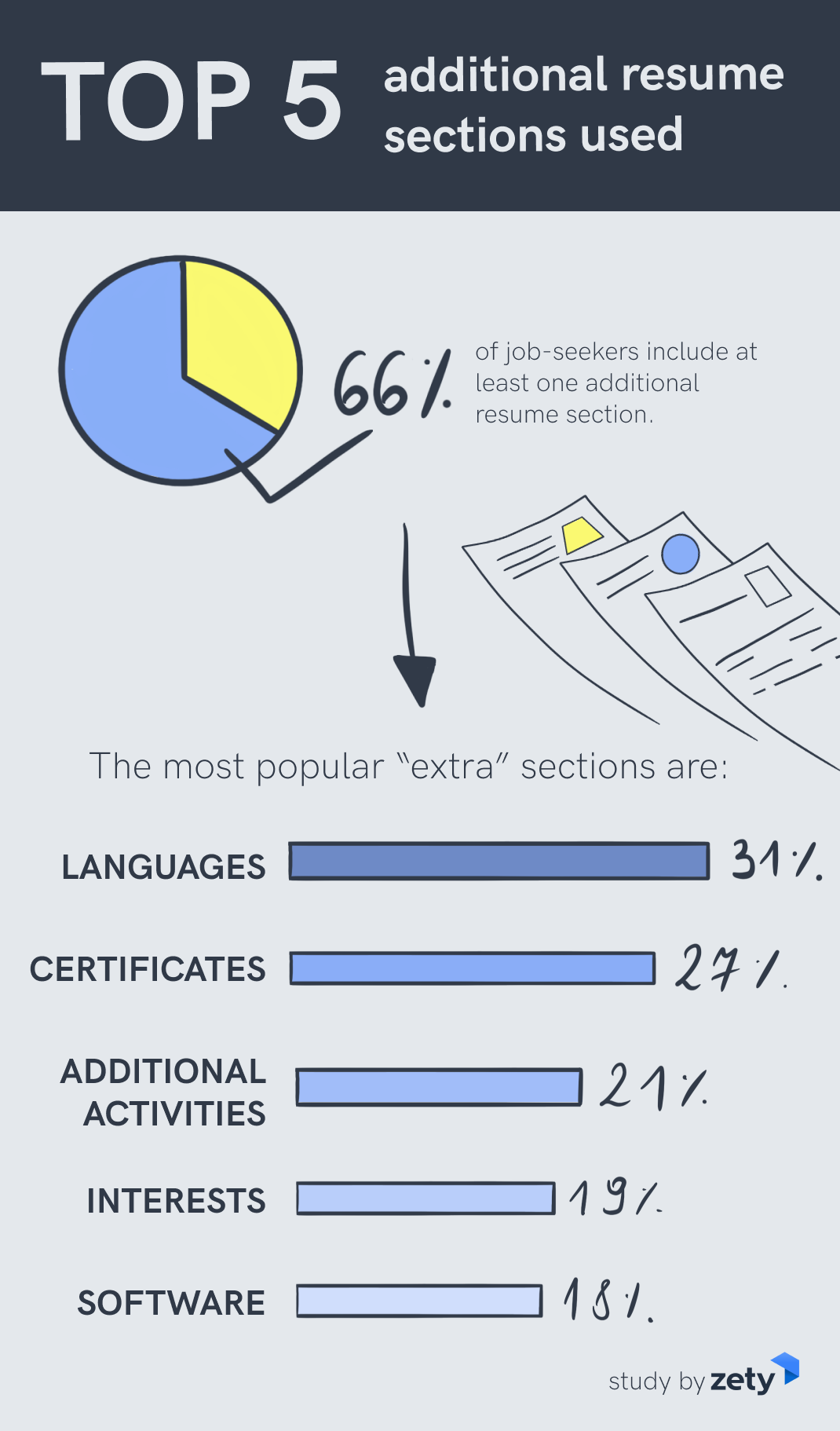
Top 10 most common “soft” skills listed in resumes
- Communication: 11% of resumes
- Leadership: 9%
- Time Management: 8%
- Problem Solving: 7%
- Customer Service: 5%
- Teamwork: 5%
- Adaptability: 4.3%
- Organization: 2%
- Creativity: 1.7%
- Conflict Resolution: 1.6%

Top 10 most common “hard” skills listed in resumes
- Microsoft Office: 12% of resumes
- Project Management: 6%
- Microsoft Excel: 6%
- Python: 3.8%
- Salesforce: 3.6%
- Java: 3%
- SQL: 2.9%
- Microsoft Word: 2.7%
- JavaScript: 2.4%
- Public Speaking: 1.9%
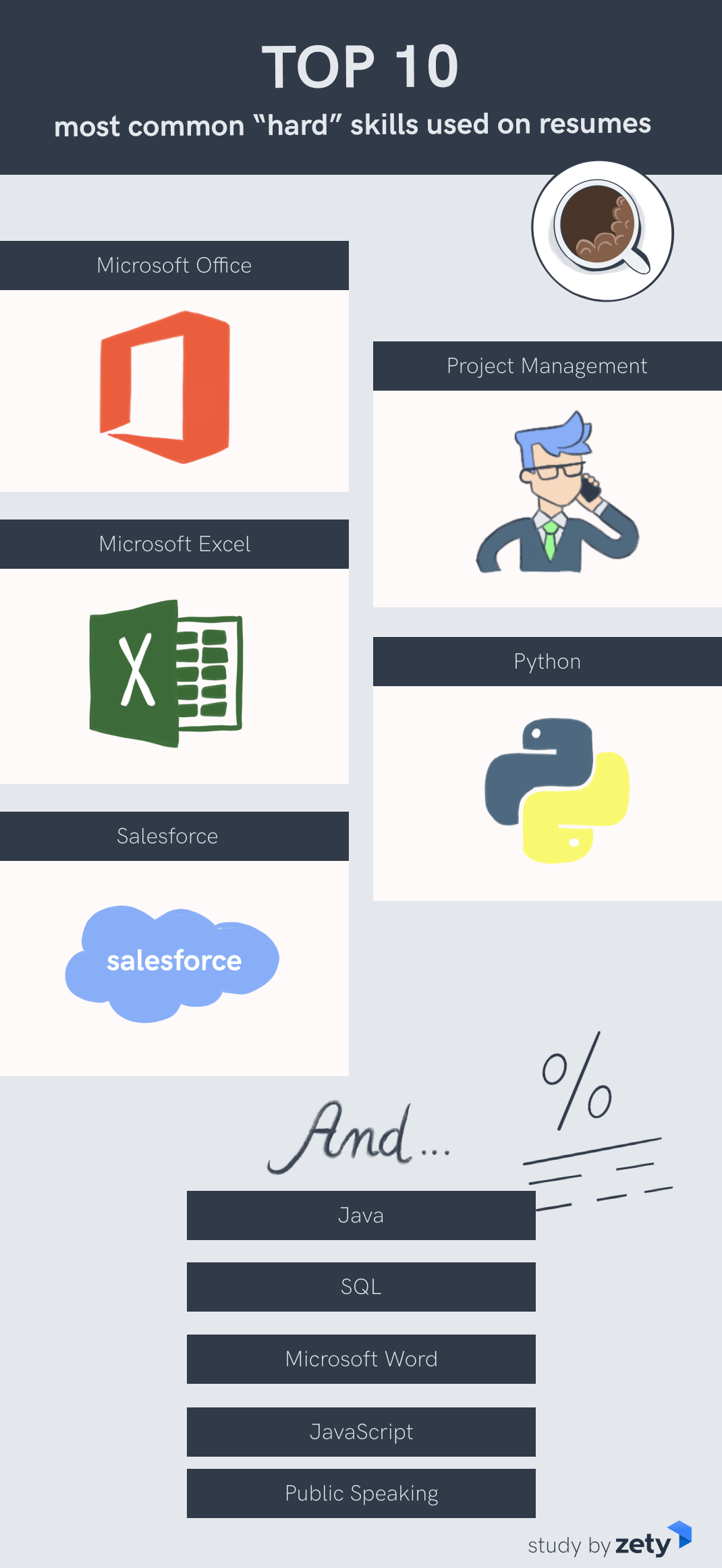
Top 10 most common foreign languages listed in resumes
- Spanish: 5.7% of resumes
- French: 4.1%
- Arabic: 3.6%
- Hindi: 2.9%
- German: 2.8%
- Russian: 1.5%
- Italian: 1.2%
- Portuguese: 1%
- Mandarin: 0.9%
- Tamil: 0.8%
Resume length
- Average resume length: 489 words (standard deviation of 310 words)
- Median resume length: 369 words
Distribution (limited to resumes no longer than 1000 words):
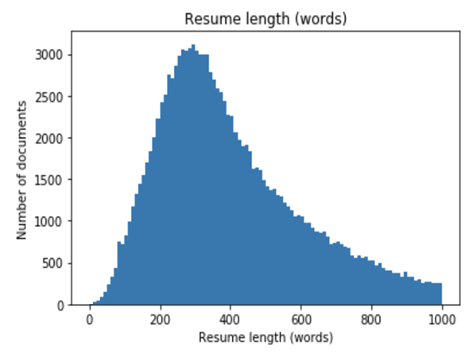
For a typical resume created in our builder, about 380 words is the single-page cut off point. The data clearly shows that an average user tries to keep her resume one page long.
Perhaps paradoxically, contrary to the popular belief, nowadays recruiters prefer two-page resumes. Data shows that recruiters are 2.9x more likely to pick a candidate with a two-page resume for managerial roles and 1.4x more likely for entry-level positions.
How many resumes per user?
- Average: 1.73 resume per user
- Median: 1 resume per user
The statistics above are particularly worrying: the most effective job-hunting strategy is to customize each resume to match the requirements from the job ad (63% of recruiters want to receive resumes tailored to the open position). To do so, it’s advised to create a new resume for each job application. Yet—most users prefer to create one generic resume and send it with all job applications.
On average, 10% of job applications result in interview invites. Out of those who land the interview, 20% are offered the job. Depending on the study, the job application success rate is between 2% and 3.4%. This means that, on average, you need to send between 30 and 50 resumes to get hired.

That said—
Certain job seekers do create multiple resumes to fit the needs of various employers. Some take it to extreme: we’ve seen 17 users with over 100 resumes created. Our first thought? They’re using our tool to run their own resume-writing business and create documents for *their* clients. We checked. Not the case. All those resumes were written by users for their personal use—they just made minor tweaks and alterations in key skills and job duties described.
The user with the most resumes created 339 of them. Is this the exact approach we’re looking for when saying “tailor your resume to match the job ad?” Maybe not. Is it more effective than spamming the same resume around 300+ companies? A non-scientific guess: at least 10x more effective.
2. Software Engineer: 1720 resumes analyzed
Sections used
Standard, “must-have” resume sections:
- Personal information: 99.7% of resumes
- Work Experience: 99%
- Education: 98%
- Skills: 92%
- Summary or Objective: 86%
Additional sections:
- Any additional section: 70%
- Languages*: 34%
- (Additional) Activities: 29%
- Software: 24%
- Certificates: 22%
- Interests: 21%
- Courses: 10%
- References: 10%
- Publications: 6%
- Legal Clause: 6%
- Conferences: 3%
- Licenses: 2%
*The section “Languages” was used by candidates to describe either foreign languages or programming languages.
Top 15 most common skills
Unsurprisingly, the most common skills on software engineers’ resumes are almost entirely related to programming languages, presentation languages, or software systems. (With the exception of “English”—though it’s a language too!)
- Java: used on 530 resumes (31%)
- Python: 450 resumes (26%)
- JavaScript: 427 (25%)
- SQL: 297 (17%)
- C#: 256 (15%)
- C++ (only listed as a separate entry): 194 (11%)
- Git: 188 (11%)
- HTML: 170 (10%)
- Node.js: 147 (9%)
- CSS: 143 (8%)
- PHP: 126 (7%)
- C: 125 (7%)
- MySQL: 122 (7%)
- Docker: 120 (7%)
- AWS (or “Amazon Web Services”): 110 (6%)
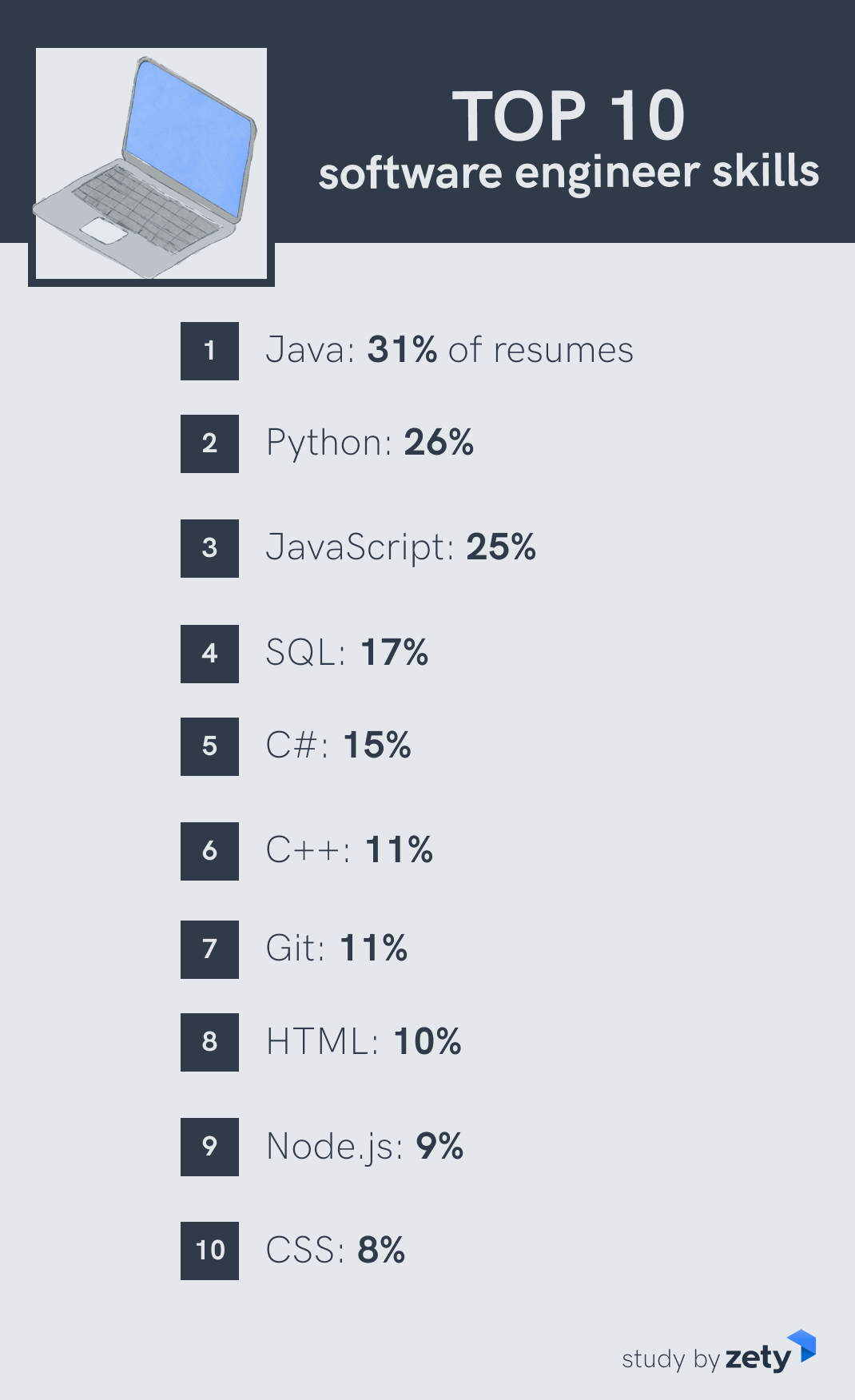
Most important resume keywords: nouns, adjectives, and verbs
Nouns
| Keyword rank | Single-word noun | Two-word compound noun |
| 1 | Java | software engineer |
| 2 | Javascript | computer science |
| 3 | Python | HTML CSS |
| 4 | software | node js |
| 5 | SQL | SQL server |
| 6 | development | ASP.NET |
| 7 | system | software engineering |
| 8 | HTML | data structure |
| 9 | application | software development |
| 10 | Web | web development |
Adjectives
| Keyword rank | Single-word adjective | Two-word compound adjective |
| 1 | new | front end |
| 2 | English | web-based |
| 3 | technical | large scale |
| 4 | various | real-time |
| 5 | mobile | new technical |
| 6 | angular | responsible new |
| 7 | different | higher secondary |
| 8 | web | internal/external |
| 9 | multiple | cross-functional |
| 10 | visual | technical new |
Verbs
- using
- programming
- based
- developed
- worked
- testing
- learning
- designed
- implemented
- solving
3. Administrative Assistant: 1381 resumes analyzed
Sections used
Standard, “must-have” resume sections:
- Personal Information: 99.9%
- Work Experience: 99%
- Education: 97%
- Skills: 96%
- Summary or Objective: 93%
Additional resume sections:
- Any additional section: 37%
- Languages: 16%
- References: 12%
- Software: 10%
- Interests: 9%
- Certificates: 8%
- Additional Activities: 8%
- Courses: 4%
- Licenses: 2%
- Legal Clause: 2%
- Conferences: 1%
- Publications: 0.6%
Top 15 most common skills
- Communication: 196 resumes (14%)
- Salesforce: 190 (14%)
- Time Management: 187 (13%)
- Microsoft Office: 186 (13%)
- Customer Service: 155 (11%)
- Problem Solving: 132 (10%)
- Organization: 126 (9%)
- Microsoft Excel: 114 (8%)
- Teamwork: 96 (7%)
- Microsoft Word: 95 (7%)
- Leadership: 91 (7%)
- Adaptability: 90 (7%)
- Computer Skills: 88 (6%)
- Multitasking: 78 (6%)
- Ability to Work Under Pressure: 55 (4%)
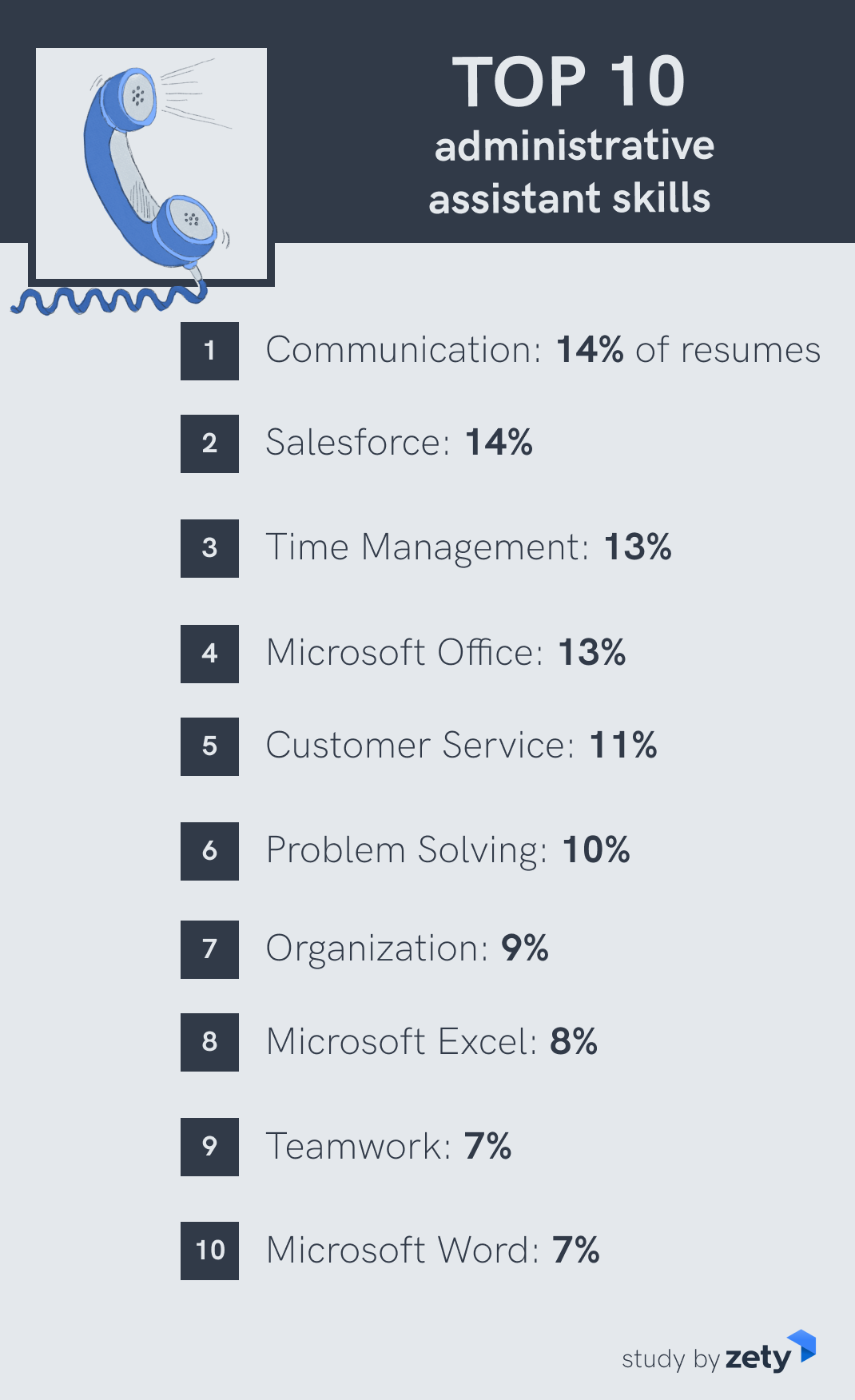
Most important resume keywords: nouns, adjectives, verbs
Nouns
| Keyword rank | Single-word noun | Two-word compound noun |
| 1 | skill | customer service |
| 2 | management | time management |
| 3 | customer | Microsoft Office |
| 4 | communication | communication skill |
| 5 | office | Microsoft Word |
| 6 | service | administrative assistant |
| 7 | Microsoft | year experience |
| 8 | assistant | high school |
| 9 | time | computer skill |
| 10 | Excel | data entry |
Adjectives
| Keyword rank | Single-word adjective | Two-word compound adjective |
| 1 | administrative | email administrative |
| 2 | new | proven email |
| 3 | high | retail-proven |
| 4 | excellent | payable/receivable |
| 5 | daily | fast-paced |
| 6 | strong | excellent verbal |
| 7 | professional | administrative multiple |
| 8 | social | corporate appointment |
| 9 | general | general appointment |
| 10 | various | internal/external |
Verbs
- trained
- solving
- including
- working
- looking
- leverage
- maintained
- scheduling
- handling
- managed
4. Project Manager: 886 resumes analyzed
Sections used
Standard, “must-have” resume sections:
- Personal Information: 99.9% of resumes
- Work Experience: 99.9%
- Education: 97%
- Summary or Objective: 94%
- Skills: 93%
Additional resume sections:
- Any additional section: 70%
- Certificates: 36%
- Languages: 31%
- Software: 24%
- Additional Activities: 16%
- Interests: 15%
- Courses: 12%
- References: 11%
- Legal Clause: 5%
- Licenses: 5%
- Publications: 4%
- Conferences: 3%
Top 15 most common skills
- Project Management: 187 (21%)
- Communication: 160 (18%)
- Leadership: 151 (17%)
- Microsoft Office: 146 (16%)
- Microsoft Project: 110 (12%)
- Problem Solving: 105 (12%)
- Time Management: 89 (10%)
- Risk Management: 68 (8%)
- Strategic Planning: 51 (6%)
- PMP Certification: 51 (6%)
- Salesforce: 42 (5%)
- Team Management: 42 (5%)
- Organization: 39 (4%)
- Negotiation: 38 (4%)
- Adaptability: 37 (4%)
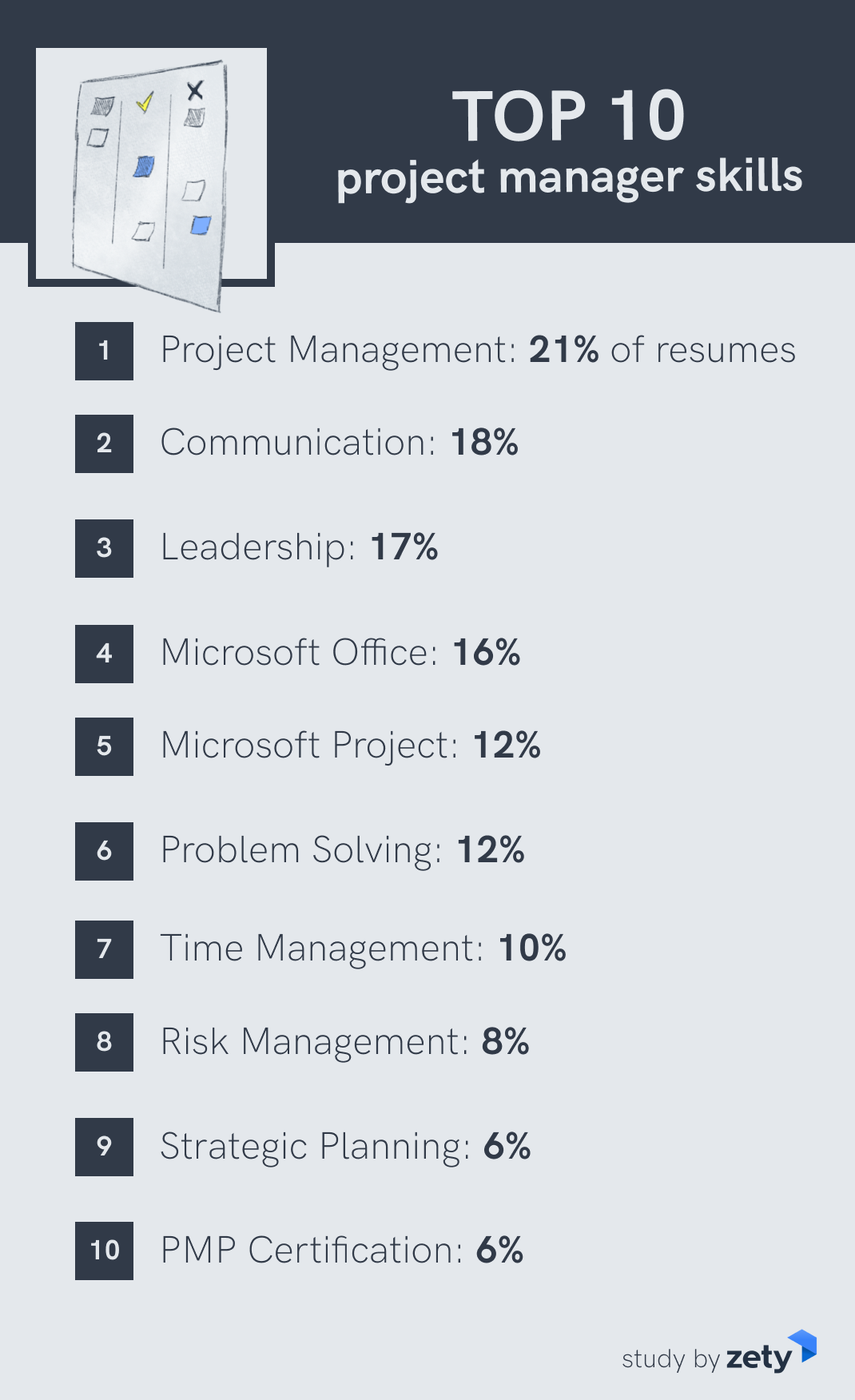
Most important resume keywords: nouns, adjectives, verbs
Nouns
| Keyword rank | Single-word noun | Two-word compound noun |
| 1 | project | project management |
| 2 | management | Microsoft Office |
| 3 | team | project manager |
| 4 | communication | time management |
| 5 | Microsoft | Microsoft Project |
| 6 | business | risk management |
| 7 | leadership | communication skill |
| 8 | skill | management professional |
| 9 | manager | process improvement |
| 10 | office | customer service |
Adjectives
| Keyword rank | Single-word adjective | Two-word compound adjective |
| 1 | new | cross-functional |
| 2 | English | internal/external |
| 3 | technical | large-scale |
| 4 | multiple | weekly-monthly |
| 5 | various | on-site |
| 6 | responsible | responsible new |
| 7 | internal | on time |
| 8 | high | long-term |
| 9 | professional | excellent verbal |
| 10 | effective | technical new |
Verbs
- including
- managing
- solving
- planning
- working
- ensure
- using
- scheduling
- leading
- testing
5. Mechanical Engineer: 831 resumes analyzed
Sections used
Standard, “must-have” resume sections:
- Personal Information: 99.9%
- Education: 99.6%
- Work Experience: 98%
- Skills: 94%
- Summary or Objective: 91%
Additional resume sections:
- Any additional section: 85%
- Languages: 49%
- Software: 43%
- Certificates: 37%
- Additional Activities: 32%
- Interests: 31%
- References: 22%
- Courses: 22%
- Publications: 10%
- Licenses: 9%
- Conferences: 7%
- Legal Clause: 6%
Top 15 most common skills
- SolidWorks: 260 (31%)
- Microsoft Office: 252 (30%)
- AutoCAD: 223 (27%)
- MATLAB: 179 (22%)
- Teamwork: 139 (17%)
- Leadership: 123 (15%)
- Communication: 115 (14%)
- Problem Solving: 113 (14%)
- ANSYS: 102 (12%)
- Project Management: 93 (11%)
- Time Management: 82 (10%)
- Microsoft Excel: 72 (9%)
- Adaptability: 41 (5%)
- Autodesk Inventor: 41 (5%)
- Microsoft Project: 40 (5%)
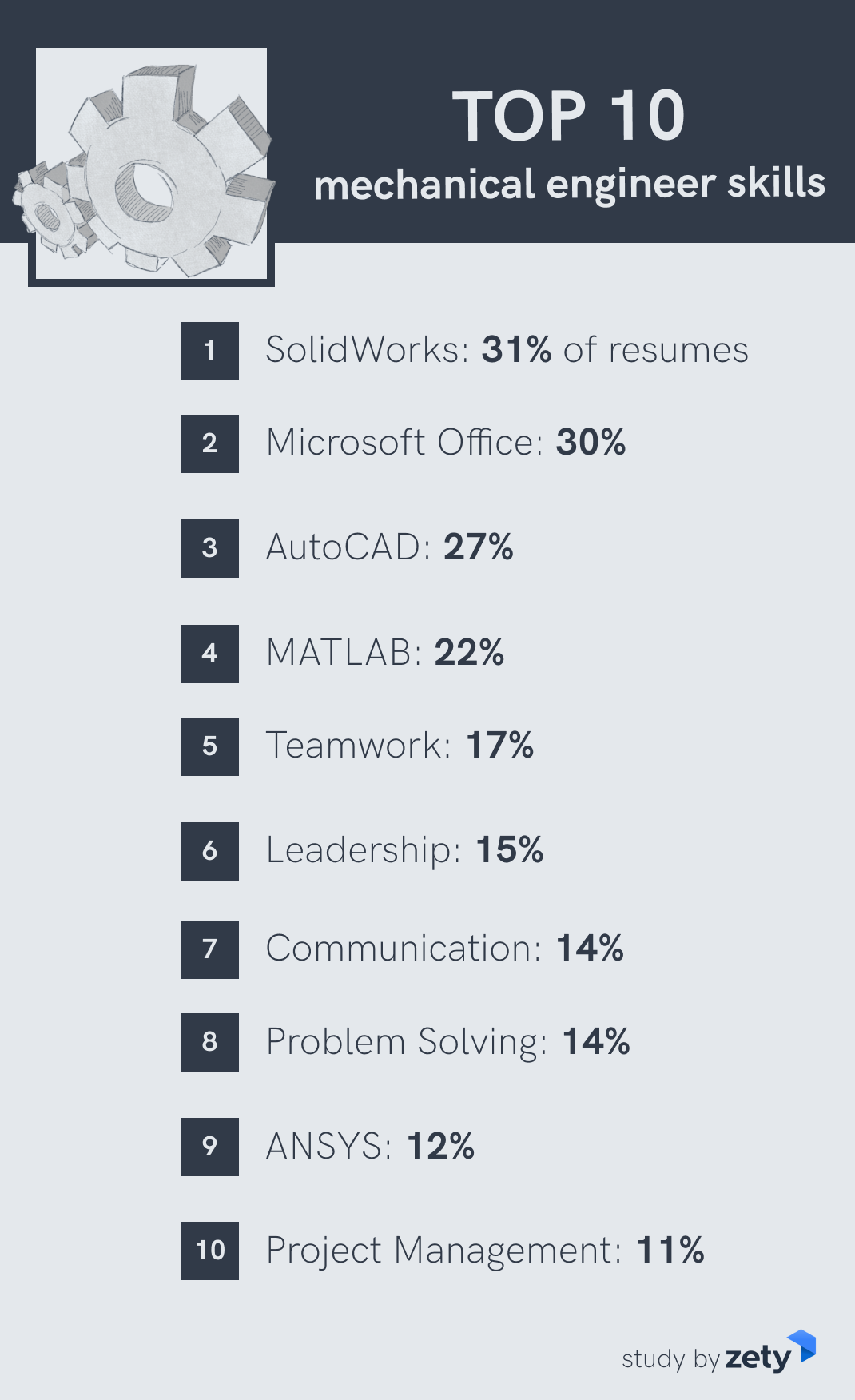
Most important resume keywords: nouns, adjectives, verbs
Nouns
| Keyword rank | Single-word noun | Two-word compound noun |
| 1 | SolidWorks | Microsoft Office |
| 2 | engineering | project management |
| 3 | design | mechanical engineering |
| 4 | project | time management |
| 5 | management | communication skill |
| 6 | AutoCAD | mechanical engineer |
| 7 | skill | Autodesk Inventor |
| 8 | office | CATIA V5 |
| 9 | mechanical | Team player |
| 10 | MATLAB | bachelor science |
Adjectives
| Keyword rank | Single-word adjective | Two-word compound adjective |
| 1 | English | true best |
| 2 | mechanical | higher secondary |
| 3 | technical | mechanical electrical |
| 4 | new | full-time |
| 5 | high | on-site |
| 6 | various | mechanical technical |
| 7 | different | cross-functional |
| 8 | Spanish | new technical |
| 9 | strong | technical mechanical |
| 10 | good | internal/external |
Verbs
- using
- solving
- working
- engineering
- designed
- testing
- programming
- manufacturing
- including
- completed
6. Customer Service Representative: 649 resumes analyzed
Sections used
Standard, “must-have” resume sections:
- Personal Information: 100%
- Work Experience: 99%
- Education: 96%
- Summary or Objective: 95%
- Skills: 94%
Additional resume sections:
- Any additional section: 37%
- Languages: 15%
- References: 15%
- Certificates: 9%
- Interests: 9%
- Software: 8%
- Additional Activities: 7%
- Courses: 3%
- Licenses: 1%
- Legal Clause: 1%
- Conferences: 0.3%
- Publications: 0.15%
Top 15 most common skills
- Customer Service: 152 resumes (23%)
- Communication: 146 (22%)
- Time Management: 104 (16%)
- Problem Solving: 95 (15%)
- Teamwork: 89 (14%)
- Leadership: 64 (10%)
- Adaptability: 62 (10%)
- Microsoft Office: 61 (9%)
- Multitasking: 50 (8%)
- Organization: 52 (8%)
- Salesforce: 46 (7%)
- Microsoft Word: 43 (7%)
- Microsoft Excel: 41 (6%)
- Computer Skills: 34 (5%)
- Conflict Resolution: 33 (5%)
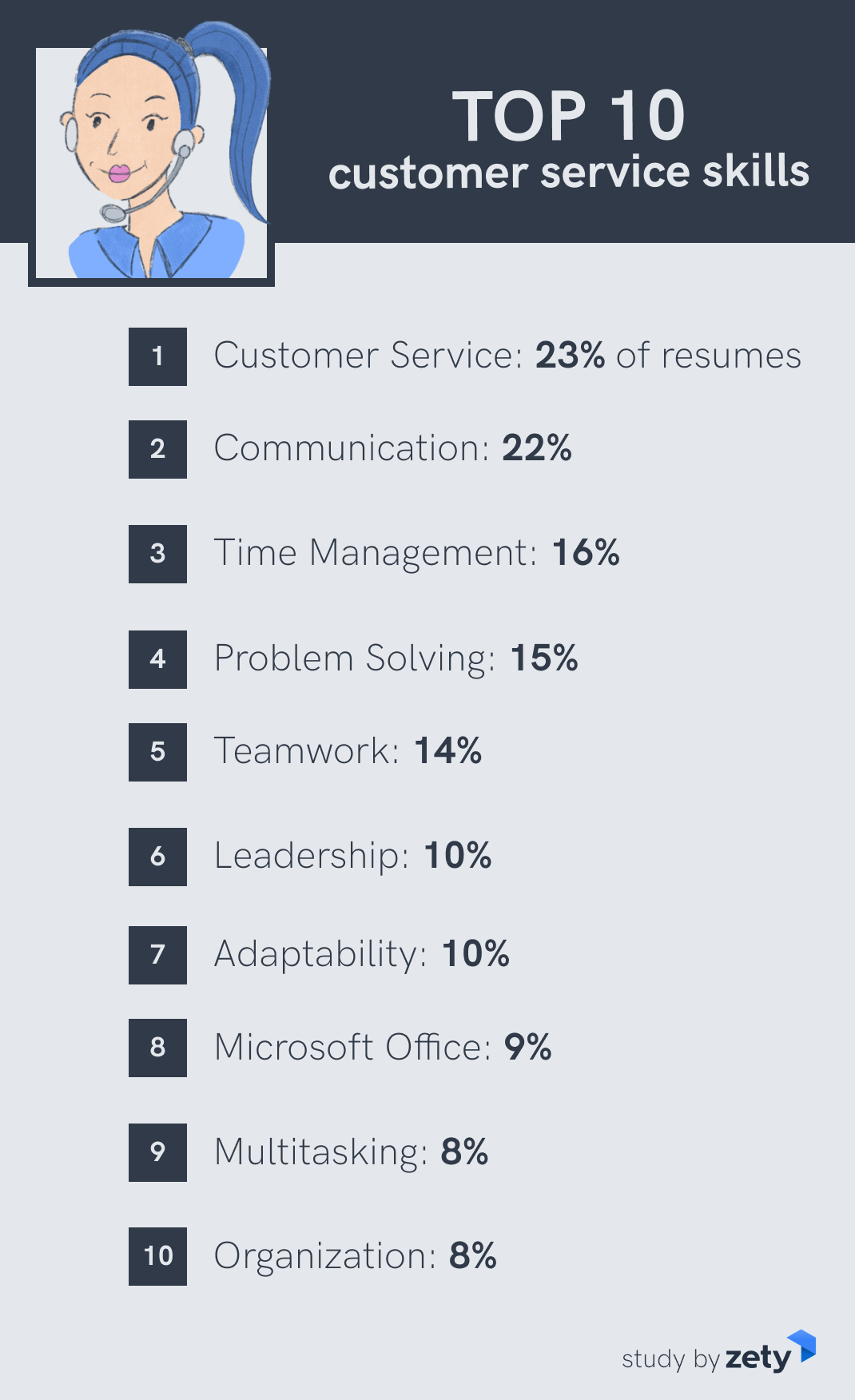
Most important resume keywords: nouns, adjectives, verbs
Nouns
| Keyword rank | Single-word noun | Two-word compound noun |
| 1 | customer | customer service |
| 2 | service | time management |
| 3 | communication | communication skill |
| 4 | skill | Microsoft Office |
| 5 | management | high school |
| 6 | problem | service representative |
| 7 | time | Microsoft Word |
| 8 | Microsoft | conflict resolution |
| 9 | sale | computer skill |
| 10 | school | years experience |
Adjectives
| Keyword rank | Single-word adjective | Two-word compound adjective |
| 1 | high | fast-paced |
| 2 | new | bilingual Spanish |
| 3 | excellent | internal/external |
| 4 | professional | excellent verbal |
| 5 | strong | full-time |
| 6 | English | excellent interpersonal |
| 7 | daily | responsible daily |
| 8 | Spanish | high new |
| 9 | positive | oriented professional |
| 10 | responsible | detail-oriented |
Verbs
- solving
- work
- oriented
- providing
- handling
- maintaining
- including
- ensure
- organized
- completed
7. Business Analyst: 391 resumes analyzed
Sections used
Standard, “must-have” resume sections:
- Personal Information: 100%
- Work Experience: 100%
- Education: 98%
- Skills: 97%
- Summary or Objective: 95%
Additional resume sections:
- Any additional section: 73%
- Certificates: 34%
- Software: 34%
- Languages: 28%
- Additional Activities: 20%
- Interests: 17%
- Courses: 14%
- References: 13%
- Publications: 6%
- Legal Clause: 6%
- Conferences: 4%
- Licenses: 2%
Top 15 most common skills
- SQL: 108 resumes (28%)
- Microsoft Excel: 73 (19%)
- Communication: 68 (17%)
- Problem Solving: 66 (17%)
- Project Management: 62 (16%)
- Microsoft Office: 53 (14%)
- Tableau: 41 (10%)
- Analytical (Thinking) Skills: 37 (9%)
- Microsoft Visio: 35 (9%)
- Python: 31 (8%)
- JIRA: 29 (7%)
- Business Analysis: 27 (7%)
- Process Improvement: 26 (7%)
- Teamwork: 23 (6%)
- Agile: 22 (6%)
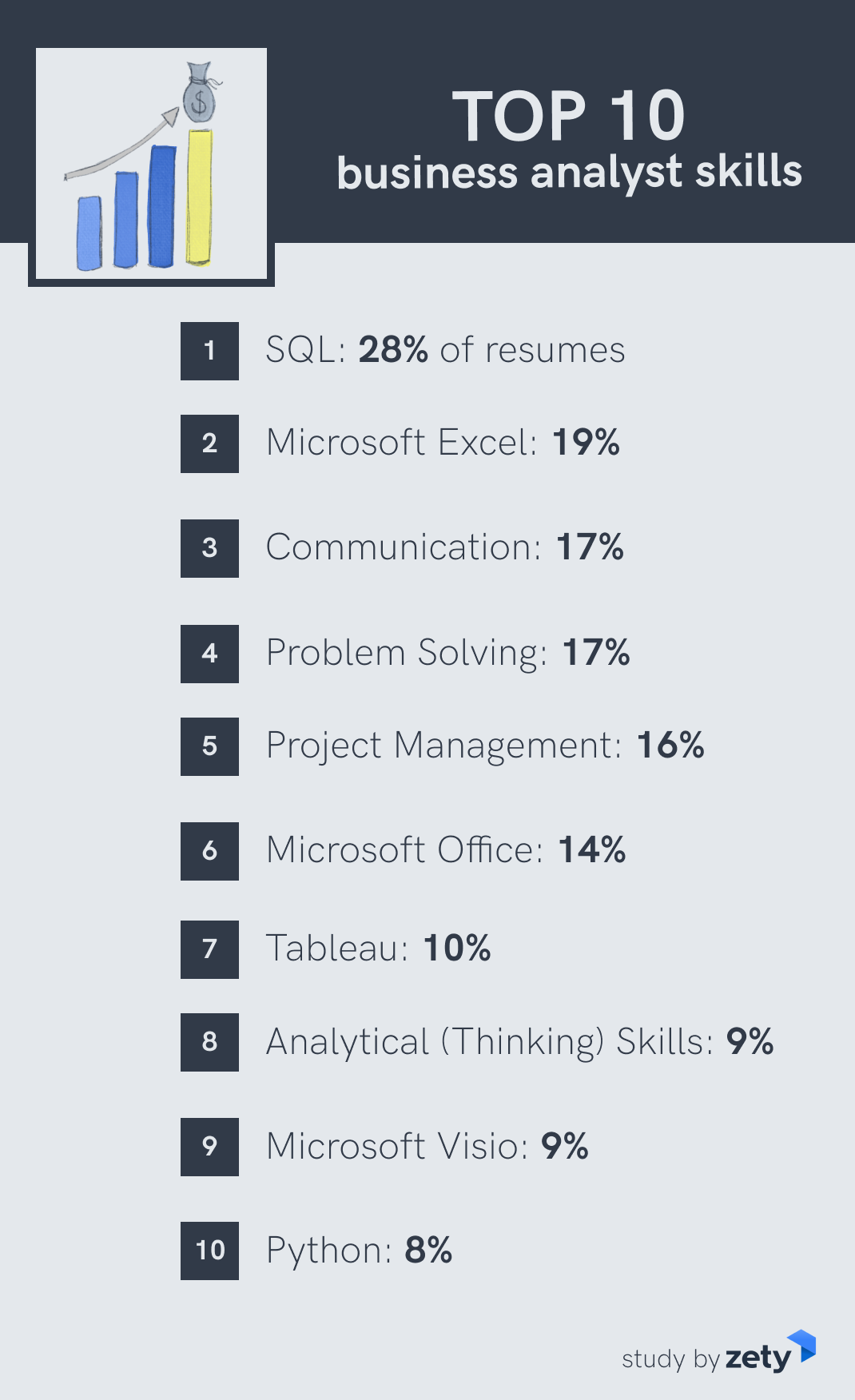
Most important resume keywords: nouns, adjectives, verbs
Nouns
| Keyword rank | Single-word noun | Two-word compound noun |
| 1 | business | project management |
| 2 | management | business analyst |
| 3 | analysis | business analysis |
| 4 | project | microsoft office |
| 5 | data | communication skill |
| 6 | SQL | business process |
| 7 | skill | data analysis |
| 8 | Microsoft | Microsoft Excel |
| 9 | process | process improvement |
| 10 | requirement | time management |
Adjectives
| Keyword rank | Single-word adjective | Two-word compound adjective |
| 1 | new | cross-functional |
| 2 | technical | internal/external |
| 3 | English | functional technical |
| 4 | financial | strong analytical |
| 5 | functional | weekly/monthly |
| 6 | analytical | higher secondary |
| 7 | various | fast-paced |
| 8 | multiple | business strong |
| 9 | different | various new |
| 10 | effective | daily/weekly |
Verbs
- using
- solving
- testing
- working
- including
- based
- ensure
- reporting
- gathering
- creating
8. Data Scientist: 377 resumes analyzed
Sections used
Standard, “must-have” resume sections:
- Personal Information: 100%
- Work Experience: 99.7%
- Education: 99%
- Skills: 96%
- Summary or Objective: 89%
Additional resume sections:
- Any additional section: 80%
- Certificates: 36%
- Additional Activities: 35%
- Languages: 32%
- Software: 28%
- Interests: 20%
- Publications: 19%
- Courses: 15%
- References: 10%
- Conferences: 9%
- Legal Clause: 6%
- Licenses: 3%
Top 15 most common skills
- Python: 174 resumes (46%)
- SQL: 141 (37%)
- R: 129 (34%)
- Machine Learning: 125 (33%)
- Statistics: 64 (17%)
- Tableau: 60 (16%)
- Data Visualization: 53 (14%)
- Spark: 37 (10%)
- Microsoft Excel: 31 (8%)
- SAS: 31 (8%)
- Deep Learning: 30 (8%)
- Java: 27 (7%)
- Data Analysis: 26 (7%)
- Problem Solving: 26 (7%)
- Natural Language Processing: 21 (6%)
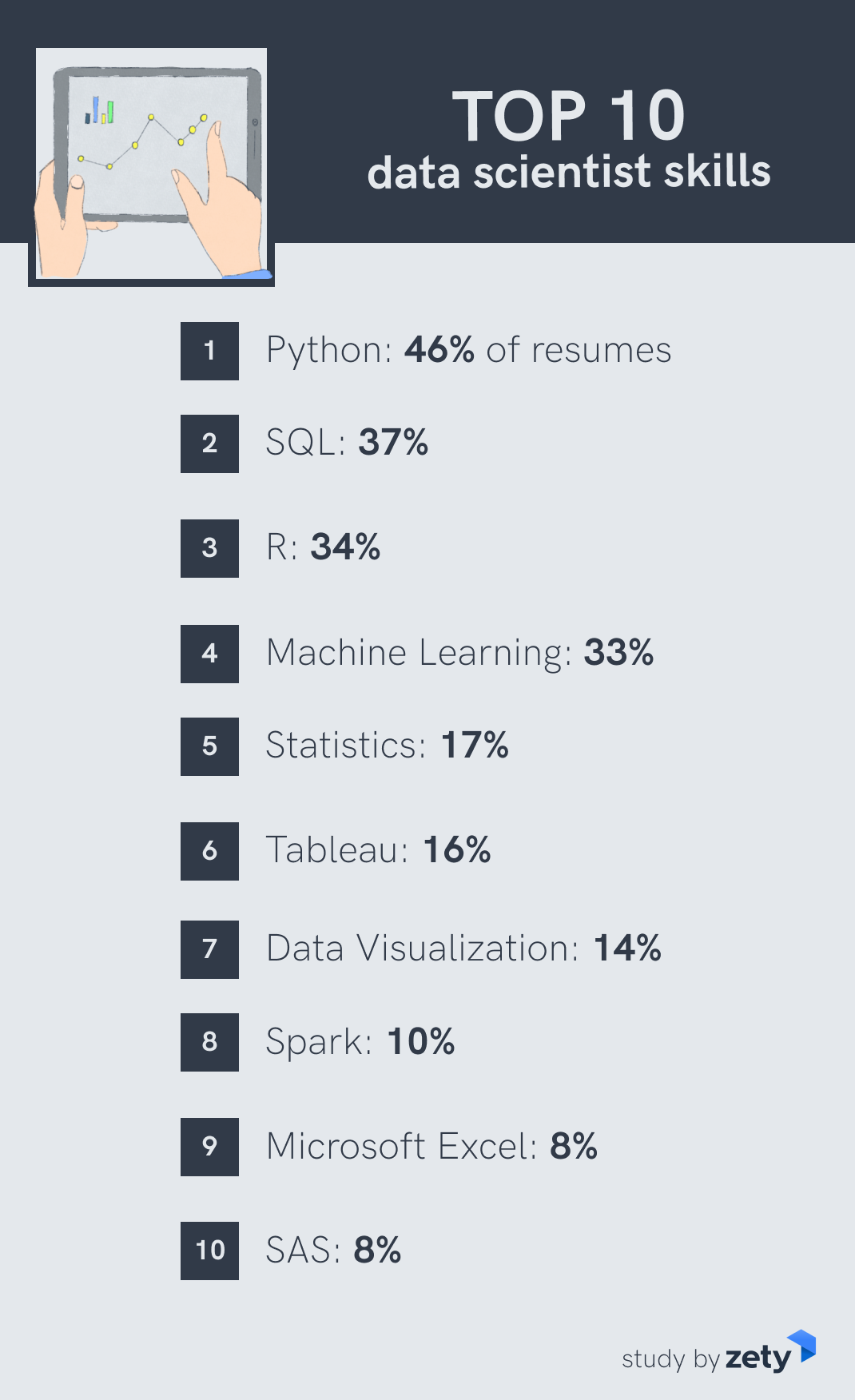
Most important resume keywords: nouns, adjectives, verbs
Nouns
| Keyword rank | Single-word noun | Two-word compound noun |
| 1 | data | machine learning |
| 2 | Python | data science |
| 3 | machine | data visualization |
| 4 | SQL | deep learning |
| 5 | learning | data analysis |
| 6 | analysis | data scientist |
| 7 | science | big data |
| 8 | university | data mining |
| 9 | statistic | language processing |
| 10 | visualization | scikit-learn |
Adjectives
| Keyword rank | Single-word adjective | Two-word compound adjective |
| 1 | statistical | data driven |
| 2 | English | statistical predictive |
| 3 | predictive | convolutional neural |
| 4 | new | large-scale |
| 5 | various | cross-functional |
| 6 | different | internal/external |
| 7 | natural | predictive statistical |
| 8 | technical | demonstrated valuable |
| 9 | deep | quantitative qualitative |
| 10 | neural | random forest |
Verbs
- learning
- using
- based
- programming
- developed
- solving
- worked
- modeling
- working
- created
9. Civil Engineer: 356 resumes analyzed
Sections used
Standard, “must-have” resume sections:
- Personal Information: 99.7%
- Education: 99.7%
- Work Experience: 97%
- Skills: 92%
- Summary or Objective: 90%
Additional resume sections:
- Any additional section: 86%
- Languages: 63%
- Software: 42%
- Certificates: 39%
- Courses: 28%
- Additional Activities: 26%
- Interests: 24%
- References: 24%
- Licenses: 14%
- Conferences: 6%
- Publications: 6%
- Legal Clause: 6%
Top 15 most common skills
- AutoCAD: 156 (44%)
- Microsoft Office: 84 (24%)
- Leadership: 49 (14%)
- Communication: 46 (13%)
- Project Management: 44 (12%)
- Revit: 44 (12%)
- Primavera: 38 (11%)
- Microsoft Excel: 37 (10%)
- Teamwork: 34 (10%)
- Microsoft Project: 33 (9%)
- SAP2000: 29 (8%)
- Problem Solving: 27 (8%)
- Time Management: 21 (6%)
- ETABS: 18 (5%)
- Adaptability: 12 (3%)
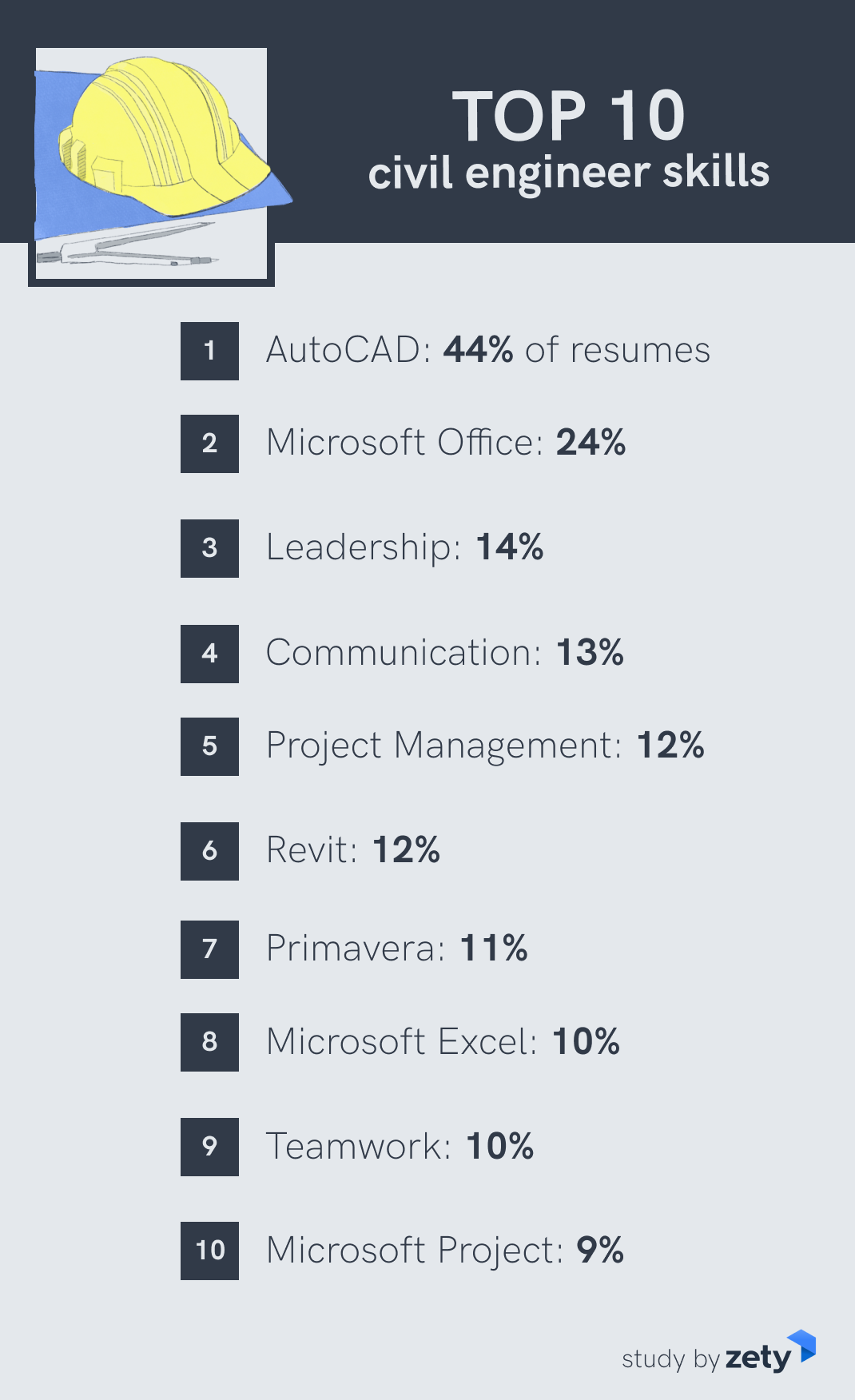
Most important resume keywords: nouns, adjectives, verbs
Nouns
| Keyword rank | Single-word noun | Two-word compound noun |
| 1 | project | Microsoft Office |
| 2 | AutoCAD | project management |
| 3 | management | civil engineering |
| 4 | engineering | civil engineer |
| 5 | civil | communication skills |
| 6 | engineer | Primavera P6 |
| 7 | skill | time management |
| 8 | office | site engineer |
| 9 | construction | Microsoft Excel |
| 10 | design | Microsoft Project |
Adjectives
| Keyword rank | Single-word adjective | Two-word compound adjective |
| 1 | English | on-site |
| 2 | technical | autonomous high |
| 3 | civil | English good |
| 4 | structural | weekly/monthly |
| 5 | good | residential/commercial |
| 6 | new | higher secondary |
| 7 | concrete | daily/weekly |
| 8 | high | structural concrete |
| 9 | Spanish | daily/monthly |
| 10 | different | civil structural |
Verbs
- work
- using
- solving
- including
- engineering
- completed
- drawing
- surveying
- planning
- ensure
10. Accountant: 344 resumes analyzed
Sections used
Standard, “must-have” resume sections:
- Personal Information: 100%
- Education: 99%
- Work Experience: 98%
- Skills: 97%
- Summary or Objective: 90%
Additional resume sections:
- Any additional section: 65%
- Languages: 36%
- References: 21%
- Software: 19%
- Certificates: 19%
- Interests: 17%
- Courses: 14%
- Additional Activities: 11%
- Legal Clause: 5%
- Conferences: 4%
- Licenses: 3%
- Publications: 1.5%
Top 15 most common skills:
- Communication: 67 (19%)
- Microsoft Excel: 53 (15%)
- Microsoft Office: 47 (14%)
- Time Management: 44 (13%)
- Quickbooks: 38 (11%)
- Teamwork: 35 (10%)
- Microsoft Word: 29 (8%)
- Problem Solving: 28 (8%)
- Accounts Payable/Receivable: 26 (8%)
- Adaptability: 26 (8%)
- Attention to Detail: 23 (7%)
- Financial Analysis: 19 (6%)
- Leadership: 18 (5%)
- SAP: 18 (5%)
- Analytical Skills: 15 (4%)
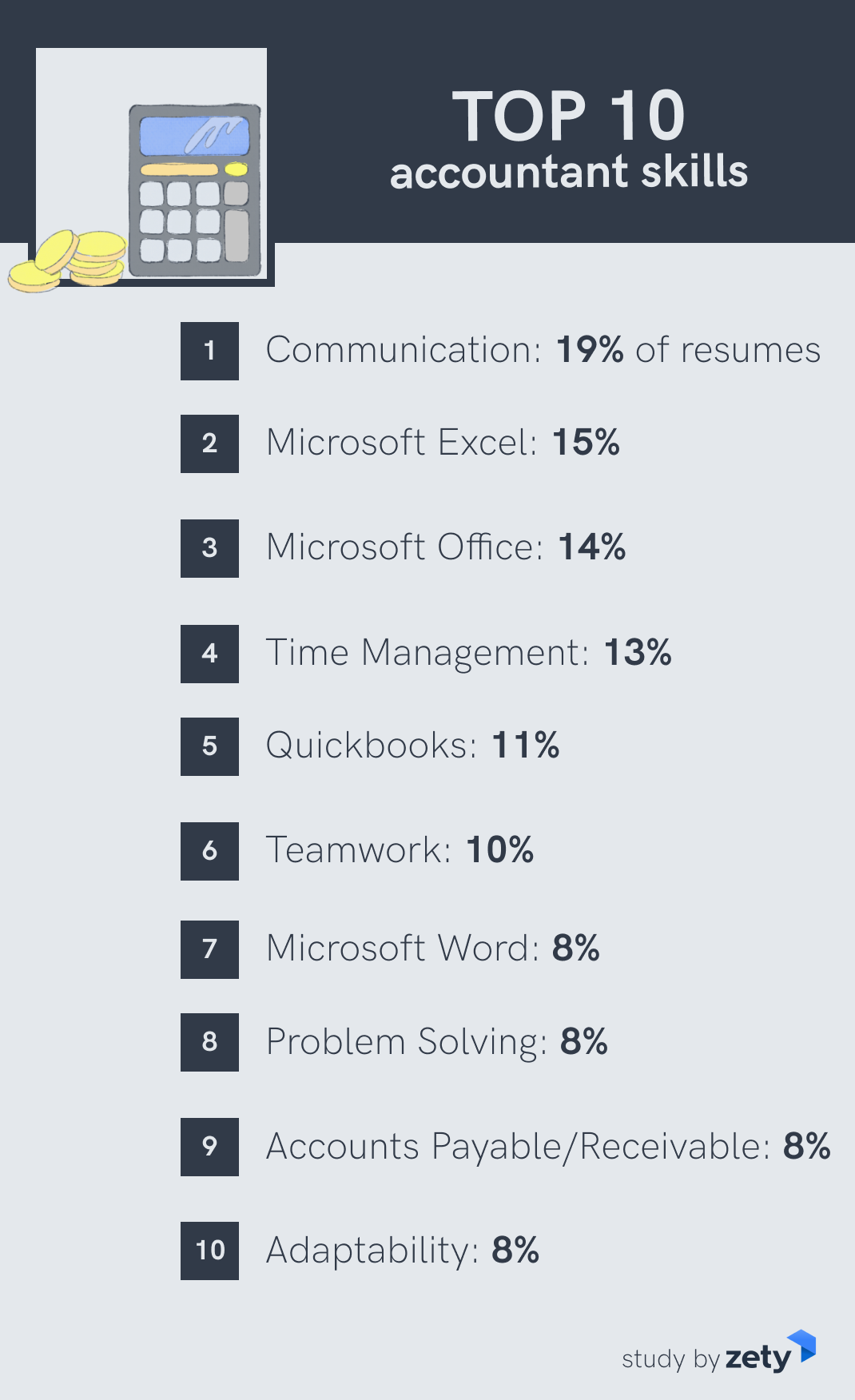
Most important resume keywords: nouns, adjectives, verbs
Nouns
| Keyword rank | Single-word noun | Two-word compound noun |
| 1 | accounting | time management |
| 2 | skill | communication skill |
| 3 | management | Microsoft Office |
| 4 | Microsoft | Microsoft Excel |
| 5 | communication | customer service |
| 6 | account | Microsoft Word |
| 7 | Excel | business administration |
| 8 | Office | accounting software |
| 9 | university | computer skill |
| 10 | accountant | years experience |
Adjectives
| Keyword rank | Single-word adjective | Two-word compound adjective |
| 1 | financial | payable/receivable |
| 2 | English | monthly financial |
| 3 | monthly | professional new |
| 4 | new | technical professional |
| 5 | payable | internal/external |
| 6 | professional | financial monthly |
| 7 | excellent | weekly/monthly |
| 8 | daily | excellent financial |
| 9 | good | excellent verbal |
| 10 | receivable | annual financial |
Verbs
- including
- work
- accounting
- solving
- oriented
- ensure
- organized
- preparing
- reporting
- seeking
11. Product Manager: 344 resumes analyzed
Sections used
Standard, “must-have” resume sections:
- Work Experience: 100%
- Personal Information: 99.7%
- Education: 96%
- Skills: 91%
- Summary or Objective: 90%
Additional resume sections:
- Any additional section: 75%
- Certificates: 36%
- Software: 31%
- Languages: 29%
- Interests: 22%
- Additional Activities: 22%
- Courses: 10%
- References: 8%
- Publications: 8%
- Conferences: 6%
- Licenses: 2%
- Legal Clause: 2%
Top 15 most common skills
- Agile: 67 resumes (19%)
- Product Management: 57 (17%)
- Project Management: 55 (16%)
- Leadership: 52 (15%)
- JIRA: 44 (13%)
- Scrum: 37 (11%)
- Problem Solving: 36 (10%)
- Strategic Thinking: 34 (10%)
- Communication: 32 (9%)
- SQL: 30 (8%)
- User Experience: 28 (8%)
- Data Analysis: 26 (8%)
- Microsoft Office: 25 (7%)
- Google Analytics: 20 (6%)
- Product Strategy: 18 (5%)
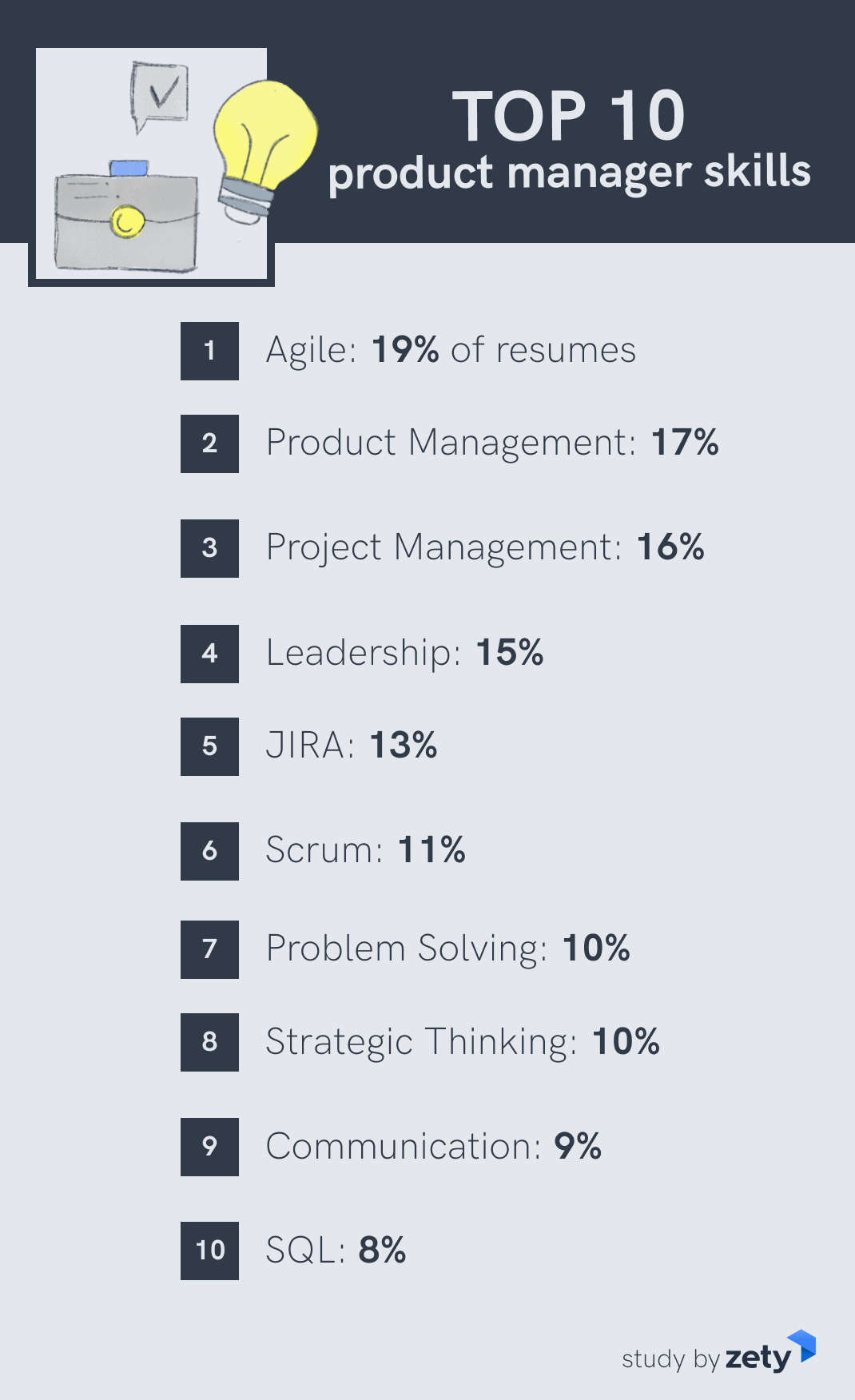
Most important resume keywords: nouns, adjectives, verbs
Nouns
| Keyword rank | Single-word noun | Two-word compound noun |
| 1 | product | product management |
| 2 | management | project management |
| 3 | project | product development |
| 4 | team | Microsoft Office |
| 5 | business | data analysis |
| 6 | development | Google Analytics |
| 7 | customer | Agile methodology |
| 8 | analysis | product strategy |
| 9 | Agile | product owner |
| 10 | strategy | time management |
Adjectives
| Keyword rank | Single-word adjective | Two-word compound adjective |
| 1 | new | cross-functional |
| 2 | English | internal/external |
| 3 | technical | new technical |
| 4 | functional | data-driven |
| 5 | responsible | fast-paced |
| 6 | internal | responsible new |
| 7 | multiple | new user |
| 8 | various | functional technical |
| 9 | mobile | new internal |
| 10 | analytical | technical user |
Verbs
- testing
- including
- using
- working
- managed
- solving
- based
- leading
- created
- developed
Methodology and Limitations
For this study, we extracted data from over 2,000,000 resumes created with our resume builder. To keep the data more relevant, we limited the analysis to downloaded resumes only (assuming those were actually used in the job search). For the analysis of the most common entries, skills, and keywords, we further limited the sample to one document per user—leaving us with 133,289 resumes.
The data for the most popular professions comes from documents in which a user’s job title exactly matches the job title discussed (i.e. for a given resume to be included in the “software engineer” resume analysis, the job title on the resume must read “Software Engineer” with no permutations such as “Senior Software Engineer” etc.).
The data was collected anonymously. For non-discriminatory reasons, users’ age and gender was not disclosed in resumes. This limits a detailed demographic analysis.
The accuracy of the data regarding the most common skills and foreign languages is limited by users’ inconsistent spelling and phrasing. We tried to include all possible variations of skill descriptions (e.g. “MS Office” or “Microsoft Office”, as well as “Spanish” or “Spanish: Fluent,” etc.), but certain instances might have been omitted. The percentages denoting the most common skills and foreign languages listed by users might be underestimated by up to 0.5.
The data regarding the most contextually-relevant keywords (nouns, adjectives, and verbs) for particular professions has been extracted using the automated TF*IDF algorithm. Certain sets of compound words might not reflect the natural use of language since the TF*IDF algorithm has been programmed to ignore some of the most commonly used stop words (e.g. “or,” “a”,” “the,” “with,” etc.).
Michael Tomaszewski is a Certified Professional Résumé Writer (CPRW), is a career writer and the newsletter coordinator at Zety.
This article was originally posted here.





























































